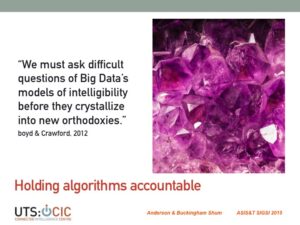What would happen if we were to develop a mindset of embracing the uncertainties (both present and emerging) that working with massive data sets entails rather than seeing them as problems to be solved? This question was the impetus for a paper which Theresa Anderson and Simon Buckingham Shum presented at the 11th Annual Social Informatics Research Symposium at the Annual Meeting of the Association for Information Science & Technology (ASIS&T). In keeping with the Symposium theme — Impacts of Social Informatics Research — Theresa Anderson presented their paper titled: Managing the Unimaginable: Applying a social informatics lens to keep the human in big data. (You can also view the screencast here)
Human-centred data science is core to the work and passion of CIC researchers, who are keenly interested in ensuring the very human features of working with data and information in the “web of computing” Kling & Saatchi (1982) speak of in a seminal social informatics text are adequately represented in the complex data assemblages we find emerging. The algorithmic accountability advocated by critical data studies brings into the open a core message that data does not speak for itself, but rather, is given a voice by the people and the algorithms that play such critical roles in the transformation of data into insight.  If unchecked, the assumptions and values embedded in the algorithms and the decisions they drive sink into everyday information infrastructure. The assemblages that evolve in this human-machine-information interplay rarely lend themselves to deliberate design and yet, ironically, as they become more naturalized and more invisible, their configuration can become more frozen. One particularly strong theme emerging in discussions about the complexity of these arrangements relates to the capacity for humans and machines in these infrastructures to learn and to respond to inevitable changes they will encounter.
If unchecked, the assumptions and values embedded in the algorithms and the decisions they drive sink into everyday information infrastructure. The assemblages that evolve in this human-machine-information interplay rarely lend themselves to deliberate design and yet, ironically, as they become more naturalized and more invisible, their configuration can become more frozen. One particularly strong theme emerging in discussions about the complexity of these arrangements relates to the capacity for humans and machines in these infrastructures to learn and to respond to inevitable changes they will encounter.
Holding algorithms accountable is such a critical area of research interest here at CIC that we have devoted one of the three PhD scholarships launched recently to this topic. We are in the midst of a profound shift to an algorithmically pervaded society, with learning analytics (as a research field and marketplace) offering a stage for how this will play out in education.
To learn more about our PhD program and explore this critical topic with us, visit the call for applications (Learning Analytics, Agency and Algorithmic Accountability)